Meet our Member Spotlights. Since we have a lot of awesome members, we want this to be a chance for you to get to know them!
DECEMBER 2022 SPOTLIGHT
Meet our Member Spotlight, Tinuviel Carlson. Tinuviel is the project manager of a science-based nonprofit, The Energy Coalition. Learn more about her below!
Tell us about yourself.
My name is Tinuviel Carlson (she/her), and I grew up primarily in Boston, Massachusetts. I moved to the Bay Area in 2015 to attend the University of San Francisco. I graduated with a BA in International Studies with a concentration in Environmental Development and a double minor in Legal and Latin American Studies.
I currently work for The Energy Coalition (TEC), a non-profit organization empowering communities to leap into the future of clean energy. I am Project Manager on the Education and Workforce Development team and support managing two main programs. First is the Energy is Everything program, which is a TK-12-grade program that provides formal and informal educators with standards-aligned, hands-on lesson plans and supplies to introduce students to environmental STEAM topics and clean energy careers at no cost. Second is the California Climate Action Corps Fellowship. In this program, I support placing Fellows at various sites across California to do climate action work focused on urban greening, food waste recovery, and wildfire prevention. I also provide mentorship and career guidance to Fellows in the full 11-month or 2-month summer term.
In my free time, I love to spend time outdoors doing fun activities like backpacking, camping, hiking, traveling, and playing with my dog. I also love food, have a thriving garden, and enjoy making things from scratch and creating new food inventions.
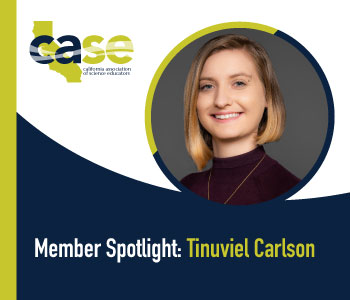
When did you join CASE?
I joined as a CASE member in 2020 because it was an excellent opportunity to get more involved with the science education community. Additionally, I presented a workshop at the 2020 and 2021 virtual CASE conferences. But it was only when I joined a CASE committee that I got more involved with the CASE Community!
How have you benefitted from joining a CASE committee?
I joined the Environmental Literacy Committee in the summer of 2021 and am now in my second term! I joined because I am passionate about sustainability and how it intersects with education. The committee has been an excellent experience building a stronger network of educators and professionals in the environmental literacy community. The committee has some incredible people that are very welcoming and have a lot of knowledge to share! I have supported enhancing opportunities to access environmental education resources in various communities through the committee. I am excited to continue working with the committee to support creating and sharing environmental literacy resources!
What is your favorite part about being involved in the science education community?
For me, knowing that I am supporting in making a difference in people's lives. Being part of the science education community, I am constantly meeting amazing people who inspire me daily with their passion for education. I have learned a lot from the people I have met through CASE and built unique connections with others. I just love the supportive community environment and how the focus always seems to be on what is next; how can we keep supporting students and people with their learning.
Why is science education important to you?
Throughout my adolescence (ages 4-18), I attended a democratic alternative education school called Sudbury Valley School in Framingham, MA. In this school model, there is a direct democracy in which students and staff are equal citizens in all decision-making. The students are responsible for their education, as there are no classes or grades. The students have free range to decide what and how they want to learn. The focus is on allowing children's inherent curiosity to thrive and for them to learn through doing. I attended my first "traditional" class when I was 16 and signed up for college-level writing and math courses to prepare for university.
When I finally attended university, I knew I wanted to do something sustainability-focused and was deciding if I wanted to focus on science or humanities. Science was so exciting to me, but I did not have a background in learning science in school before my undergrad, which made it intimidating. I decided to go the humanities route and take as many extra science classes as possible.
Now, when I tell people I work to bring sustainably focused STEM lessons to classrooms, I often get the response, "wow, I wish I had access to something like that when I was in school." I feel that it is essential for kids to get introduced to science and sustainability at a young age to help demystify and inspire students to become change-makers. Understanding the scientific process and problem-solving associated with STEAM subjects is essential to make the necessary connections and changes to improve the world.
What is your favorite book or movie? Why?
Always hard questions to answer, and I never have one answer!! However, I love anything unpredictable; my favorite types of movies are the ones that leave you with more questions than answers. Anything thought-provoking and strange, you know, the ones that leave you asking, "what did I just watch?" Some examples are movies from the following directors, M. Night Shyamalan, Yorgos Lanthimos, Jordan Peele, and most films from the production company A24!
I love that the focus is on unique character development, and always when I think I figured something out, there is a huge plot twist! The mystery and problem-solving elements are so thrilling. I also love how it is a great conversation starter!
AUGUST 2022 SPOTLIGHT
Meet our Member Spotlight, Brenda Quispe. Brenda is a pre-service teacher with a goal of teaching in a dual imersion classroom at a S.T.E.A.M. focused school. Learn more about Brenda below!
Tell us about yourself.
My name is Brenda Quispe (she/her/hers) and I'm Peruvian-American. I'm a non-traditional student, a parent. Currently, I finished up my student teaching in a wonderful 2nd grade classroom. I'm excitedly transitioning into getting my own elementary class!
As a young child, I found myself fascinated with cause and effect and asking questions in learning about the natural world. My parents didn't have the confidence in their skills to support my interests. I also lacked family finances to be able to participate in activities outside of school to keep my curiosity engaged. Eventually, I found my calling in education. I took so many science classes during my undergrad that I became qualified to minor in it. My credential program invited aspiring educators to attend a virtual CDE Foundation STEAM Symposium. I was able to attend and enjoyed all the great information! One of the attendees talked about CASE so I looked into it and signed up to get email updates.
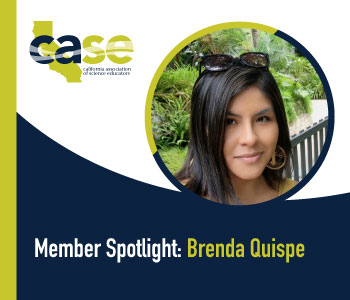
What do you hope to accomplish in the next five years?
Within the next 5 years, I'll be earning my Masters. I will also get my Bilingual Authorization so I can teach in a dual immersion classroom at a S.T.E.A.M focused school. I'm interested in applying to a CASE committee where I can provide the most support. In my district, I would like to focus on increasing parent engagement and see what I can do to make the most impact in my community, especially to the most marginalized. I'm hoping to stay involved with my Fresno Discovery Center too.
How has being involved with CASE helped prepare you for your future career?
I'm barely getting involved with CASE. I am looking forward to the conference so I can learn more from others and be able to implement those teachings in my class. I was glad to be able to check out a hub of past recordings from last year's conference. Now I know there's a whole community of science educators that supports one another.
What would you tell any pre-service educator who is considering joining CASE?
I'm just beginning my journey in being involved with CASE. I would have liked to learn about it before so I could have been able to be involved earlier. I believe that all educators should join to be able to get access to all the resources, networking opportunities, as well as to gain and strengthen new skills through being active members. There's a discount for all pre-service educators of $10 going on right now!
How have you benefited from joining a CASE committee?
It's been an amazing experience to have been able to be part of a committee to connect and collaborate with others. I have been able to meet other educators that have shared valuable information as I transition to become an elementary school teacher.
Do you have any advice for someone who wants to choose a career in science education?
Remember that you will be creating the next generation of innovative, critical thinkers!
DECEMBER 2021 SPOTLIGHT
Meet our December Member Spotlight, Dr. Art Sussman. Dr. Sussman is an accomplished educator with a passion for environmental literacy. He has also written various articles for our monthly newsletter California Classroom Science (CCS). His vast portfolio of work can be found on his website, and you can find his latest CCS article here.
Tell us about yourself.
I grew up in New York City in a working class, Jewish/Catholic neighborhood. The local Orthodox synagogue was our family’s cultural center. Despite my religious training, a few years after Bar Mitzvah, I rebelled and became an atheist. Now I value my religious upbringing for motivating me to think deeply about how we all came to exist, who I am, what the universe is, the values/challenges of human communities, and how science and spirituality reinforce each other. 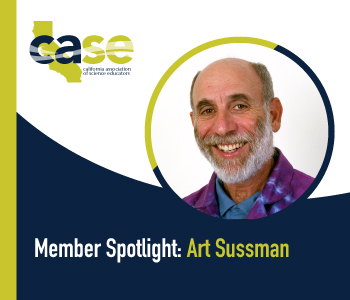
Inspired by the book Microbe Hunters, I knew by age 10 that I wanted to be a research scientist. 18 years later, after getting a Biochemistry PhD and two postdocs, I had “turned on, tuned it, and dropped out.” Fortunately, my partner Cheeta had also lost her desire to continue as a research scientist. Together, with our 3-year-old daughter, we joined a hippie commune in beautiful, coastal Mendocino County and lived in a tipi and a rustic cabin. As much as we could, we grew our own food, met our energy needs, and celebrated an uplifting, imperfect, communal utopia that still deeply resonates within us. Unfortunately, you had to be there to really know what those times felt like. May we have a modern ecological, equitable reincarnation.
I volunteered helping teachers in the local K-8 and high school, including getting a state grant to teach about energy and save energy in the schools. Within a year, we reduced energy usage by 30%. I credit those years with those teachers and students as my training to be a K-12 science educator. Later, I further developed educational skills in a program that I helped start at UCSF, which partnered the university’s researchers and resources with the San Francisco Unified School District. After that, I was fortunate to work for more than two decades at WestEd, collaborating with great educators and directing long-term grant programs.
How did you develop a passion for environmental literacy?
I initially developed a passion for nature through hiking and backpacking. The major immersion was through living full time in nature, by a river, surrounded by a redwood/fir forest. My land partners and neighbors had country and construction skills that I lacked, and I was able to reciprocate by contributing science and math skills. My wife and I loved being able to apply our science knowledge/skills in meeting our food, energy, and water needs.
Protecting the environment was integral to Native American life and a keystone of hippie counterculture. In my science education work, I especially valued opportunities to help educators and students with environmental science education. I discovered that K-12 environmental education in the 1980s focused on local issues and was not significantly addressing the global issues that were worrying me: global warming, the ozone hole, and biodiversity extinctions.
My first major WestEd grant included Utah. Fortunately, they wanted to develop a 9th grade Earth Systems course for all students. Collaboratively developing and implementing that course resulted in my writing a book called Dr. Art’s Guide to Planet Earth. I became known as an Earth Science guy, but please don’t ask me questions about rocks.
How were you introduced to CASE?
My first grant sequence at WestEd involved working for 13 years with California, Arizona, Nevada, and Utah to help systematically improve science and math education. As part of that work, we partnered with the state science departments and the state science teacher associations. Our biggest collaboration with CASE (CSTA at the time) involved an NSTA-funded program to establish, inform and network science teacher points of contact throughout California.
What is your favorite movie or book? Why?
My favorite books are science-rich nonfiction (e.g., books by Jared Diamond). My favorite fiction is thoughtful science fiction. My current favorite is Kim Stanley Robinson’s The Ministry for the Future. The book begins by accurately describing our current climate and social inequity crises. I love how the novel provides a longish term scenario linking science, technology, interesting characters, politics, and equitably radical actions that help humanity extricate itself from doom and gloom.
If you could only eat one type of cuisine for the rest of your life, what would you choose and why?
Hippie organic potluck food including lots of fruit, limited amounts of fish and poultry, and occasional cheating with chocolate desserts. Chosen for health, taste, and connections with happy memories.
AUGUST 2021 SPOTLIGHT
Meet our next Member Spotlight of August, Anthony Quan! Anthony is a STEM coordinator from Southern California who has worn many hats in the education field.
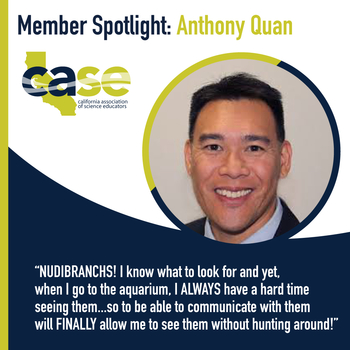
Tell us about yourself
I am the STEM Coordinator with the LA County Office of Education. I was a former middle school teacher, TOSA, and whatever the district needed from me! I have been in education for close to 25 years, additionally spending time as a former Informal Science Administrator (Manager of Teacher Programs with the Monterey Bay Aquarium) and several Teacher Education Programs (CSU Long Beach, Claremont Graduate University, UCLA).
What is the best part about having a career in science education?
The best part of having a career in science education is like science itself...you never know where you are headed professionally. I thought I would spend my entire career in the classroom. Instead, because of CASE and other opportunities, I learned and am still learning, how to improve science education for all students. More importantly, just being able to potentially raise the possibility of getting any student to imagine themselves in a science related field. And in my case, helping to elevate my daughter's ideas of what a STEM Career looks like!
Over these last 25+ years, the landscape of Science Education have been changing and growing with an endless set of possibilities to improve science education..
How did you first get to join CASE?
My 1st ever science conference was also my first formal entry into Professional Development as a backup presenter with the K-12 Alliance. I was supposed to deliver an investigative workshop with GAK (aka slime). Having never done anything, I asked for advice. I was told to prepare materials and handouts for about 30-40 people. I was also told not to worry, as I would have an experienced presentation partner with me....So the day of the PD comes, and it is a huge room. I had over 100 people in the room (and they were still coming in) already getting settled and my partner never showed up....so for the next hour, it was me working the room to make sure everyone was getting what they needed. That same day, people were calling me GAK man for the rest of the conference. 20+ years later, I have missed only 1 conference, helped plan a few conferences, and was even the 2018 conference chair!
Why is being a member of CASE important to you?
It is an organization that is always fighting for what's right, creating experiences for so many different stakeholders, and just an all-around fun group to be around.
What is your favorite movie or book? Why?
Wow! I have read too many books and seen many movies...so I am going to have to go with whatever comes to mind first...which happens to be Cruella...LOL! It was such an imaginative retelling and perspective on Cruella's side of the story. It was fun watching this with my daughter.
If you were magically granted the ability to communicate with animals, but could only choose one type of animal to communicate with, what would it be and why??
I have been heavily influenced by Jill Grace and so many others....so I am going to have to say "NUDIBRANCHS"!!! I know what to look for and yet, when I go to the aquarium, I ALWAYS have a hard time seeing them...so to be able to communicate with them, will FINALLY allow me to see them without hunting around...hahaha.
AUGUST 2021 SPOTLIGHT
Meet our first Member Spotlight of August, William Pettus! William is a high school biology teacher who loves the outdoors! Learn more about him below!
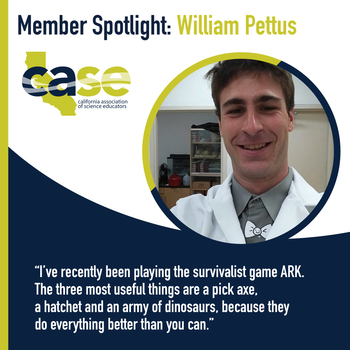
Tell us about yourself
As a Science Educator, I am starting my second year as Biology Teacher at a Rural High School in Northern California. When I am not in the classroom, I am either running, hiking, backpacking, rock climbing, or swimming. As you can probably tell, I spend a lot of time outside, which is where I developed my love for biology in the first place. Even though I love the environment and four legged creatures (of which I have three), my favorite things to study are the intricate systems of microbiology, including protein synthesis and DNA/RNA synthesis.
Why did you decide to become an educator?
I remember sitting down in the family den helping my mom grade papers (which at first was just me stamping stuff). Over time I actually started to grade papers, and fulfilled my middle school and high school volunteer hours as a teacher’s aide. So I suppose I never had a true choice in the matter, but after a few years of being a children’s therapist where the work was pretty lonely, I wanted a more collaborative career in the classroom with the ability to enhance many more children’s lives than I could ever do in one-on-one hour long sessions.
How did you first get to join CASE?
I first joined CASE by signing up for a CASE NGSS professional development on Discourse! All I am saying is that no other professional development has asked me to make a model of the Mantis Shrimp by creating a bow out of popsicle sticks, Q-Tip, and dental floss and then talk about it exactly as I would ask my students to talk about it. It was one of the best professional developments that I have ever attended and was presented by a multiplicity of teachers and state staff actually responsible for NGSS adoption in California.
What do you think makes CASE special?
CASE is the first educational organization that has actively tried to reach out and meet and greet its members where they are, in addition to providing awesome professional development that actually feels worth it and guidance towards state legislation/policy (or sometimes the lack of it). It also connects a wide array of members from museum experts, curriculum writers, teachers, and other formal and informal science educators where science education as an identity is put first rather than an exclusive teachers only group.
What is your favorite movie or book? Why?
My favorite book is Jack London’s The Sea Wolf. A sickly book critic is capsized on a San Francisco bound Ferry in the fog and rescued by a surly and salty but very erudite whaling captain by the name of The Sea Wolf and their ensuing adventure. It waxes and wanes on the philosophy of life, love, and industrialization/capitalism which is very much in line with Jack London’s own activism.
If you were stuck on a desert island and could only bring 3 items with you, what would they be and why?
I’ve recently been playing the survivalist game ARK and the first chronicle of the game is that you are stuck on an Island. The three most useful things are a pickaxe to mine metal and flint, a hatchet to cut stone and get wood, and an army of dinosaurs because they do everything better than you can. Best advice though, unless you are Tom Hanks or Matt Damon, you probably should not get stuck on an island.
JUNE 2021 SPOTLIGHT
Meet our next June Member Spotlight, Slav Palchevskiy!
Slav is a college professor from Southern California who teaches lab chemistry at West Coat University. He also works as an Association Project Scientist at UCLA's School of Medicine. Learn more about Slav below!
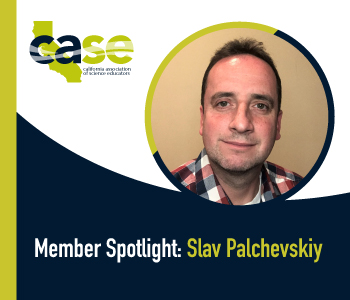
Tell us about yourself.
Currently, I am an Associate Professor at West Coast University (WCU), which is a private university with the focus on educating healthcare professionals. I am also an Associate Project Scientist at UCLA, working in the School of Medicine, Pulmonary and Critical Care division, where I am involved in a research with the primary emphasis on exploring the role of T-cell biology during pathogenesis of pulmonary disorders and lung allograft rejection.
When I completed my Ph.D. at the University of Southern California in 2007, in Molecular Biology, I joined UCLA as a postdoctoral fellow and accepted a part-time position at WCU as well. I have been teaching the laboratory portion of the chemistry course at WCU for the past 11 years. The chemistry laboratory was a perfect place for me to interact with students and to engage them in active learning. As of right now, I am teaching an online chemistry course and looking forward to when our labs will resume with on-campus instructions.
In my free time, I love watching TV, especially action and adventure movies and a good TV sitcom. I feel like a total nerd but I really liked “The Big Bang Theory” and was sad when it was over. I enjoy reading and always looking forward to new books by my favorite authors such as Michael Connelly, J. A. Jance and the double team of Douglas Preston and Lincoln Child.
Since you are new to CASE, what is your favorite part about being a member so far?
I only joined CASE recently but I was genuinely impressed by the dedication and commitment of the leadership team and how accepting they were in welcoming me into the organization. I also look forward to connecting and interacting with other members to share ideas and strategies on how to be a more effective educator. I am excited about the idea of “circles” and looking forward to joining or even to start a new one.
What do you hope to gain from a CASE membership?
I hope CASE will provide me with many opportunities to grow and to master my craft. I am excited to explore the possibilities of being involved and serving on the committees, which would allow me to demonstrate and enhance my leadership and teamwork abilities and skills.
I am eager to connect with educators with various areas of expertise to discover and implement new best practices and teaching resources and to share my experiences and values. We can all learn from each other and bring a new spark and a new twist into our classrooms to provide a positive and supportive environment to facilitate student’s learning.
Professional development is another aspect that I am enthusiastic about. I would like to access the webinars and other virtual/digital resources to enhance skills and knowledge and to stay up-to-date on changes within the field.
Tell us about one (or a few) of your favorite moments from your science education career.
This happened several years ago during one of my chemistry laboratory sessions. We were discussing the concept of chemical reactions and I wanted to demonstrate the “Elephant’s Toothpaste” experiment. This is where you mix hydrogen peroxide with soap, add a catalyst and watch the stream of foam shoot high into the air.
After several weak attempts, I finally succeeded and the foam raised several feet up. Many students were surprised with this unexpectedly vigorous reaction. “Well, I guess that is the best I can do today,” I said with the intention of wrapping things up. “Dr. Slav, I bet I can do better and hit the ceiling!” I heard someone say. “Can I try that?” Speaking of an avalanche effect, I heard more and more requests to try this challenge from the students, even the quiet ones.
It was amazing to watch students enjoy themselves trying different things to achieve the common goal, to show me that they can do it better than their instructor. The whole class was now involved where several separate groups were on the quest to “hit that ceiling.” The outcome… well... I have several color spots on the ceiling as the testimony that the goal was successfully achieved. It was a great exercise for my students, but not so much fun for me - cleaning foam off afterwards.
This is an example of the importance of “hands-on experience” and teamwork that are instrumental for students’ learning and success because students learn better by doing things.
What is your all-time favorite movie or book? Why?
My favorite movie is “The Lord of the Rings.” It has an incredible cast, great storyline and excellent life lessons. It teaches us about friendship, collaboration and teamwork towards achieving the common goal to overcome obstacles, challenges and sacrifices that people have to make.
My favorite quote is by Queen Galadriel who said that “even the smallest person can change the course of the future.” I love that, since all of us make a difference in the world every single day, regardless of our position in life.
If a new planet were discovered, what would you name it and why?
My family is extremely important to me. I have been married for over 16 years and have two amazing kids. Therefore, I would name the newly discovered planet as “HESTIA”. In the Greek mythology, Hestia is the goddess and protector of home peace and family happiness.
Meet our first June Member Spotlight, Desiré Whitmore!
Desiré works at the Exploratorium, and her career has mostly revolved around physics. Also known as LASERchick, she has experience in building and designing LASER and microscopy systems. Learn more about Desiré below!
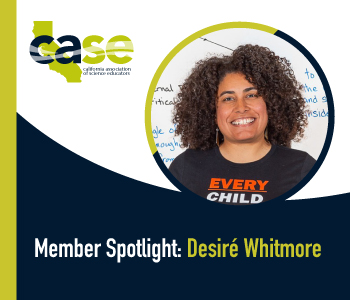
Tell us about yourself.
I am a Southern California Native, and a product of the California Public School system. I am currently the Sr. Physics Educator and Staff Physicist at the Exploratorium in San Francisco. We work to provide quality professional development for science teachers with a focus on inquiry-driven, hands-on science. Also known as the LASERchick, my background as a scientist is in Chemical Physics, where I designed and built LASER and microscopy systems to study molecules vibrating in real time, electrons travelling across metals and semiconductors, and quantum dot nanoparticles for my doctoral and postdoctoral research. Before coming to the Exploratorium I was a professor at Irvine College, where I taught Physics and was the Director of the LASER and Photonics Technology program—a hands-on Career Technical Education (CTE) program that taught students essential skills for working in the LASER and photonics field.
Prior to being a professor, I was a curriculum and app developer in the Learning Design Group at the Lawrence Hall of Science in Berkeley for the all digital, K-8 Amplify Science Curriculum. My focus there was to provide science content, write scientific articles (for middle school units) and books (for elementary units), as well as develop some of the unit simulations, and several of the Engineering Internships. I learned a lot about NGSS and K-8 education as a curriculum developer, and am very happy to know that Amplify Science has been well received in schools and districts across the country.
What would you tell someone who is considering joining CASE?
Joining CASE is definitely worth your time and money because of the resources and the community that you gain. Being in affinity with other like-minded educators alone is a huge perk.
What is the best part about being a CASE member?
The annual conference is a great opportunity to learn about current pedagogies, curricula, and classroom materials. I am biased, of course, because the Exploratorium offers several hands-on workshops at this conference every year.
Tell us about one (or a few) of your favorite moments from your science education career.
One of my favorite moments in science education is having had the opportunity to write the Light Waves unit for the Amplify Science curriculum. I worked with a great team of educators on that project, and got to create a simulation for students that allows them to design their own custom LASER! Because of my background in the optical sciences, I felt very connected to that unit, and I was even featured as a Professor and LASER spectroscopist within the unit. I love that I still receive feedback from teachers around the country who are using this curriculum and have students that love learning about my scientific passions, or find inspiration in seeing a woman of color as a representative scientist.
Another favorite moment of mine is teaching my first Summer Institute at the Exploratorium in 2019. This is an annual three-week, hands-on institute held at the museum where my colleagues and I share some of our favorite phenomena-based learning with teachers from across the country. We have 4 Institutes happening simultaneously: Leadership, HS Life Sciences, HS Physical Sciences, and MS Science. As a physicist, I teach the physics science institute along with the amazing Eric Muller, where we dive deep into topics like perception, light interference, sound, electricity, and even animation! That experience was such a pleasant whirlwind and I got to simultaneously flex my teaching muscles and learn so much from the TI staff and all of the teacher participants. I also got to compete in the annual Iron Science Teacher event that summer and, though I didn’t win the competition, I thoroughly enjoyed every moment of being a part of it. As the culmination of my first year teaching at the Exploratorium, this experience was definitely a great place to reflect on how I made the right decision to leave academia for education.
What is your all-time favorite movie or book? Why?
My favorite book is The Count of Monte Cristo, by Alexandre Dumas. The story is so incredibly long and rich, and most of it is told by people relating their experiences to others. There are even stories within the stories, which I find so incredibly satisfying. It is like an archeological dig where you just keep finding more and more layers that help you understand the characters and their motivations on a deeper level. I also love that it has a diverse set of characters that can learn from each other’s experiences, though they often choose not to. The story of someone who was put through unnecessary misery and finds their way to happiness again is always one that I will enjoy.
My favorite movie is Spiderman: Into the Spiderverse, directed by Bob Persichetti, Peter Ramsey, and Rodney Rothman. That movie is fantastic. It is a serious homage to comic books (maybe the best comic book movie ever made in my opinion), and is a movie that makes me emotional every time I watch it. I identify very much with the main character, Miles Morales, as a multi-cultural “smart kid” who has to navigate going through advanced classes for his education alongside peers that don’t relate to or identify with him. His journey throughout the movie, learning to accept who he is and bring his full identity to everything that he does instead of always comparing himself to others (including stepping into the giant shoes of his predecessor Peter Parker to become spiderman) is one of the most inspiring things that I have seen on the big screen and I find strong parallels with my own journey through science education and my struggles with imposter syndrome. “Anyone can wear the mask. YOU can wear the mask. If you didn’t know that, I hope you do now.”
What quote from a book, movie or poem best describes your life? Why?
“Learning does not make one learned: there are those who have knowledge and those who have understanding. The first requires memory and the second philosophy.” ~The Count of Monte Cristo, Alexandre Dumas.
This quote reminds me that the way that I was taught to learn in primary and secondary school never aligned with the way that I learned in the real world and in graduate school. I try, whenever possible, to understand not just what happens, but also why and how it happens. I also find a parallel of this quote in the work that we do with inquiry and NGSS. We are asking the questions that we are curious about in order to develop a connection between science and our everyday lives, instead of only memorizing facts to gain knowledge that we will forget tomorrow because we have no practical use for it.
MAY 2021 SPOTLIGHT
Meet our next Member Spotlight of Teacher Appreciation Month, Steve Soth!
Steve is a preservice teacher from Los Angeles who wants to teach high school. Learn more about Steve below!
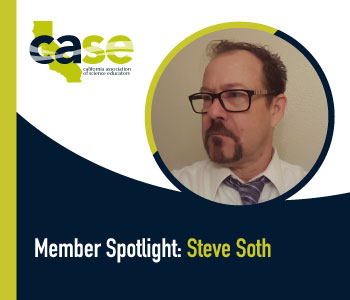
Tell us about yourself.
I am a first-generation Angelino, and a Lakers/L.A. Kings fan. I am a career changer with experience in the medical industry and field biology plus water science, and have always been involved with team building and staff training. I was a member of a college soccer team and a university cycling/race club during my undergraduate studies. I was almost a music major and at this point I hope to bring more science behind the arts (i.e. music and food science) in my science classes. A feather in my cap for me as an educator could be that I'm a high school soccer coach and a sports science specialist.
What are your goals once you obtain your degree?
My first goal is being a high school teacher, with a focus in the natural/physical sciences, and within the next 1-2 years to start graduate school. I have an idea to teach a physics class with a focus on body movement, such as stunt work. Being in L.A. presents a lot of science options and instructional resources for me.
What would you tell other future educators who are considering joining CASE?
CASE provides me with a launching pad for networking and filling my toolbox with not only skills, but personal growth and maturation into a role model. At this stage in my career as a preservice educator and embarking into the job market, having a supportive collective of mentors is essential for me.
How has being part of CASE helped prepare you for the classroom/education field?
The programs available through CASE have been supplemental to my growth and development during my credential program at California State University, Northridge (CSUN). I have taken advantage of the opportunities to join CASE as a pre-professional, visit the Teacher’s Conference in Los Angeles, and discover and participate in the many free CASE webinars if/when I have the time. I’ve learned the importance and practice of mindfulness as a teacher and to be in tune with the students before they are seated.
What is your all-time favorite movie or book? Why?
As far as my entertainment interests at home, I have been watching 2 genres of movies – one is the marvel universe (eg. Iron Man 2), the other is space science (The Martian). I like Iron Man because of the charisma that Robert Downey Jr. brings to the Iron Man role, and I like Matt Damon’s character in The Martian. My wife says I act like Mark Watney at certain times, which I am willing to believe is a compliment (haha).
If you could start a charity, what would it be for and why?
For my philanthropic interests, I have an affinity for aquatic life. I would want to help conservation efforts in South America for sea turtles or create a conservancy for pink dolphin habitat. I have been involved in Not-for-Profit organizations as a youth Boy Scout and believe in thinking for 7 generations into the future. I credit my parents for exposing me to community involvement and to consider the greater good of society.
MAY 2021 SPOTLIGHT
Meet our first Member Spotlight of Teacher Appreciation Month, Emmanuel Onyeador!
Emmanuel is from Oakland and has an extensive history of teaching computer science to high school and college students from underrepresented groups. Learn more about Emmanuel below!
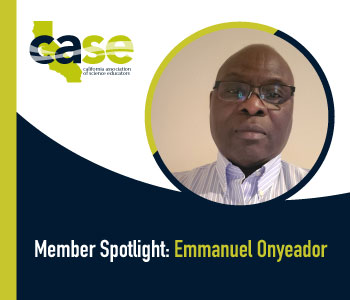
Tell us about yourself.
I started teaching computer science in 1996 in the computer science and technology academy I founded at Oakland Tech in order to address the problem of underrepresentation and underproduction in the computing field often referred to as the digital divide in Oakland, California. This academy operates as a small school within a school model. Students commit to taking 3 years of computer science courses as part of their high school program, which will prepare them for college and career in the computing fields. For more than 15 years, I was the only Advanced Placement computer science teacher in the entire Oakland Unified School District teaching AP CSA and then AP CSP.
l spend much of my teaching time developing strategies to address the issues of equity and access to computer science, particularly for the underrepresented groups in Oakland and students at risk of dropping out of school. I was an APCSP College Board National Pilot for 3 years and spent an earlier 4 years piloting Beauty and Joy of Computing for the University of California Berkeley. I am not only passionate about teaching computer science to my students, but also committed to the best retention strategies until graduation.
I developed several partnerships with major technology companies as part of my interest in building a work-based learning component of the computer science academy. This led me to become a Cisco Certified Instructor in 1998 and also an Oracle Certified Instructor back in the summer of 2000.
I am currently on special assignment and director of the computer science academy. I am a consultant, content writer, and coach for the National Mathematics and Science Initiative where I support teachers and students furthest away from opportunities to become successful in computer science education.
I started by teaching Mathematics in my first 6 years during which I was the 1995 recipient of the Apple Computer Partners In Education Grant before starting the computer science academy where I enjoyed teaching computer science.
As a graduate student research associate, I helped design the Expert System that Monitors the Accelerator at Stanford Linear Accelerator Center in 1992. For a period of 5 years, I worked on the MMAP project at the Institute for Research on Learning in Palo Alto.
I helped design astronomy units, including units using satellite mission data for Chabot Observatory and Science Center in Oakland and served as a member of the infrastructure planning committee that helped plan and relocate the new Chabot Science Center.
I received the 2013 National Center for Women in Technology Educator of the Year award for the part I played to increase the participation of girls in computer science education. I was one of the 100 computer science teachers honored at the white house by President Obama on December 8, 2014, and received the Vice President’s Globe Teacher Award in 1996. I received the 2019 ACM Senior Member award (lifetime) to honor my work in computer science education.
I have been an Adjunct Professor at California State University, East Bay, University of California, Berkeley Extension, University of Phoenix, and the University of California, Riverside Extension.
How did you first get to join CASE?
I was invited by a member and co-chair of the 2021 Conference Committee who reached out to me to join the conference planning committee. It was a meeting of like minds and a welcoming environment where everyone’s opinion is valued and respected. You always know when you find yourself among wise people who are there to collaborate and share their knowledge for the good of the order. It did not take much time for me to decide that joining CASE was the right thing to do.
What would you tell someone who is considering joining CASE?
I would advise them to join CASE because it presents to them a unique opportunity to network with a larger community of educators who want to inspire their students and help to increase interest and the science achievement of all students. Passionate and dedicated educators are in very high demand.
Do you have any funny Zoom/virtual learning stories you’d like to share?
It was not really funny depending on how you feel about it. Someone in a Zoom meeting actually thought they had their camera off when indeed they did not. He went into the bathtub and only realized it when someone called out on the host to remove him from the forum. He was removed eventually but not after he visibly went into panic mode. Needless to say that it was not the best sight. People must be careful as we tread through this new normal which is changing the way we do everything.
What is your all-time favorite movie or book? Why?
“A man who calls his kinsmen to a feast does not do so to save them from starving. They all have food in their own homes. When we gather together in the moonlit village ground it is not because of the moon. Every man can see it in his own compound. We come together because it is good for kinsmen to do so.”
― Chinua Achebe, Things Fall Apart
This is my favorite book for many reasons. It portrays an Igbo traditional village set in the southeastern part of Nigeria and truly captures many of the realities, which are depicted in our daily lives. CASE presents a platform for science educators to come together to share best instructional practices, improve pedagogy, and create the best scientific minds for the 21st century. They do so not because they cannot thrive well in their school or district but because it is good for science educators to collaborate and share their passion and interest on a wider scale. When we work as a team the results speak for themselves. The future of our students, and indeed the world will be much better.
What is the first thing you would do if you won the lottery?
I would still keep my job, my passion, and my interest but would definitely set up funds for a special STEM Institute to broaden the participation of under-served and underrepresented students in the field of computer science education. This is work that I have done all my life. I would like to continue this project using all that I have learned over the years but carefully implementing it without all of the unnecessary bureaucracies, wastes, and politics that often make it less easy to navigate.
APRIL 2021 SPOTLIGHT
Meet our next April Member Spotlight, Kelsey Lipsitz!
Kelsey is an educator at San Francisco's renowned Exploratorium who loves scuba diving! Thanks for taking the time to interview with us, Kelsey!
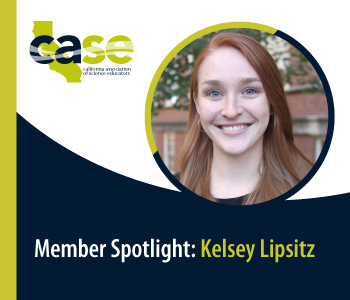
Tell us about yourself.
I love being outdoors and observing the world around me! I grew up in the Midwest and taught fifth grade for several years. Science was my favorite subject to teach, so I always sought professional learning opportunities that would help me learn more about the field.
My most memorable professional development experience was taking a trip to Ossabaw Island near Savannah, Georgia to watch sea turtles lay their eggs. That trip inspired me to reach out to my undergraduate science methods instructor and ask her what opportunities would enable me to more fully explore science education. Shortly after that call, I went back to graduate school for a doctorate in Science Education.
Now I get to work with amazing people at the Exploratorium, a science museum in San Francisco, California to help develop professional learning for educators dedicated to science teaching in the elementary classroom. I love having the opportunity to explore the phenomenon at the museum and think about how to bring those experiences into the elementary science classroom. I still love being outdoors and living in California has given me the opportunity to explore beaches, forests, and mountains much more frequently.
How did you first get to join CASE?
I first joined CASE when I moved to California and started my position as a Science Educator at the Exploratorium. My first annual conference was in Pasadena, California and I remember being struck by how friendly and welcoming everyone was, and how excited people were to be there. The conferences are opportunities for us to share our experiences with a passionate group of science teachers, but also to learn from educators across the state and to connect with folks we see on the screen but do not get to see as often in-person. I look forward to the day we can all reconnect at the CASE conference.
Why is being a member of CASE important to you?
Being a member of CASE is important to me because it connects me with so many wonderful educators, experiences, and programs across the state. I really value the opportunity to learn from teachers who engage their students in creative and thought provoking science experiences, and from professional learning providers than plan thoughtful and supportive programs for their teachers. I also love being part of a community who works so hard to advocate for science, and who are dedicated to ensuring all students can access science.
What is the best part of being an educator?
The best part of being an educator is being able to collaborate with others to develop interesting, student-centered learning experiences that encourage students to love science. We’ve recently been making short videos that educators can share with students that help them carry out student-centered inquiry experiences at home with readily available materials. Our team has had a lot of fun thinking about ways to keep students engaged with science regardless of whether they are online or in the classroom. The experience has enabled us to learn new skills like filming phenomenon, and editing videos. Having these opportunities to be creative, learn new skills, and collaboratively develop products that we think students will enjoy and learn from is always really energizing.
What is your all-time favorite movie or book? Why?
This is a really tough question! My favorite genres are fantasy and science fiction. There are so many series that I love, but my current favorite is a series written by Tomi Adeyemi called, Legacy of Orïsha. The first two books of the trilogy have been released, and I could not read them fast enough. The world of magic and the characters she created are absolutely beautiful. There are books that you are sad to leave and put down, and these were definitely two of them.
If you could choose to live in one movie or TV show for a day, what would it be and why?
I would choose to spend a day in the South African kelp forest featured in the documentary, My Octopus Teacher. I learned to scuba dive several years ago and absolutely love observing the world that exists under water. The ocean is my happy place, being on the beach or in the water always offers some valuable perspective. Although there would be some logistical things to figure out (e.g. I don’t know how to free dive) and it would be really cold, it would be amazing to join filmmaker, Craig Foster, as he moves through the kelp forest and attempts to understand the wildlife that lives there.
APRIL 2021 SPOTLIGHT
Meet our first Member Spotlight of April, Tim Baker!
Tim is an independent educator from Central California who founded his own science education company! Keep reading to learn more about Tim!
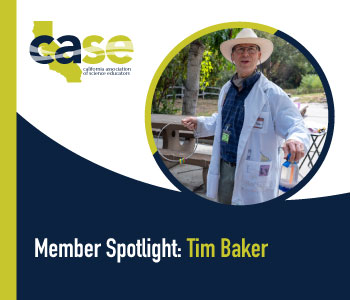
Tell us about yourself.
I am an independent science educator. I founded a science education company in 2013 to better enable me to teach children, 12-years old and younger, what I love to teach and how I love to teach it.
I am a credentialed educator with six years’ experience in the regular classroom. Prior to that, most of my teaching experience has been in environmental education, out-of-doors.
It has been thoroughly gratifying for me to meld together science, education, and business.
Why is being a member of CASE important to you?
Being a lifetime member of CASE provides me with a sense of belonging to something professional. I am an independent educator, so I am not with any one school. When I attend CASE conferences, I feel a great sense of camaraderie. Once a year I get to visit an interesting location. I always add to my social network and my repertoire.
In your opinion, what makes CASE special?
When I think of CASE, I only think of the conferences. These are very simply what I find to be completely gratifying. I value being about to learn new content and new ways to disseminate it. CASE conferences provide me with something I cannot easily gain from watching a YouTube video or by reading a book. I teach my students the same way I get to learn at CASE conferences: materials-intensive, genuine, and immersive.
I’ve attended about a dozen conferences. One experience really stands out: the Sacramento Scavenger Hunt. It was like an “Amazing Race” thing in which I was teamed up with about three other wonderful teachers. We raced—literally ran—through the streets of Sacramento adjacent to the conference center in search of landmarks having to do with science, history, and education. Upon completion we each were rewarded with a golden “thumbs-up” trophy, delicious hors d’oeuvres, and excellent socializing. If you can believe it, it’s activities like these that I use to teach my students—of all ages. I have never been disappointed by CASE conferences.
What is the best part about having a career in science education?
I am fascinated by the natural world and “scientific” phenomena. Every time I have the opportunity to guide children through experiences regarding these things, I get to relive the excitement of learning about these things, vicariously through my students.
I also recognize that by presenting to children the chance to experience authentic “scientific” activities, the more these things will enrich their lives. My hope is that they will forever be inquisitive and appreciative of the natural world around them.
A quote: “If you find something to be boring, keep asking questions until it’s not.” –the guy who invented digital imagery
What is your all-time favorite movie or book? Why?
Island of the Blue Dolphins by Scott O’Dell is my all-time favorite book. This book was among the “Indian” themed reading list for Moorpark Public Library’s Summer Reading Program when I was around the age of eight. It was exciting to learn that a thriving civilization predated mine right there in my Ventura County. That summer reading program--the certificate of completion I still have--led me to becoming a lifetime learner in regards to the natural world, science phenomena, indigenous peoples, and human culture. I earned a different colored bead for each book I read, and I got to string them to a necklace made of hemp. How cool is that?
If you had the opportunity to explore the bottom of the ocean or outer space, which would you choose and why?
I’d rather explore the bottom of the ocean. It would be more doable for me: less math. Additionally, I like the idea of exploring a “more finite” world and one that’s closer to us.
MARCH 2021 SPOTLIGHT
Meet our next Member Spotlight of March, Arlene Laurison!
Arlene is a teacher from the Sacramento area who is LOVES chemistry! Thank you for taking the time to interview with us, Arlene. Learn more about her below!
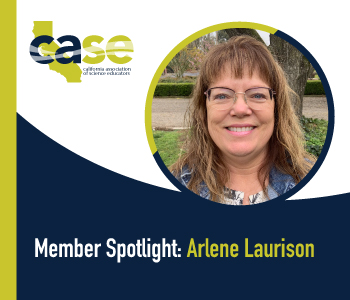
Tell us about yourself.
Chemistry is my passion! My father bought me a chemistry set when I was 9 years old and I knew from that day that chemistry was my vocation. I have a bachelors and a masters degree in chemistry. After graduating, I worked as an environmental chemist in the private sector for 12 years. It was exciting and challenging. I was the supervisor for the Gas Chromatography department where we analyzed water and soil samples.
When I married and was ready to start a family, I decided to take a break from lab work and teach. I have taught chemistry at Sheldon High School in the Elk Grove Unified School District, south of Sacramento for more than 20 years. My plan had been to return to the lab when the children entered school, but I loved teaching so much, I never left!
How did you first get to join CASE?
When the children got old enough, I was able to become more involved in professional development. I have always advocated for professional associations and CASE is no different. I maintain membership in multiple organizations.
In your opinion, what makes CASE special?
CASE is special because it is run by passionate, volunteer educators who are driven to improve science education for all. The organization not only educates teachers in cutting edge, researched based curriculum and pedagogy, but it also ensures that those who make decisions regarding science education are well informed by maintaining a line of communication with policy makers. It is also a great way to network with other like-minded science educators!
What are some valuable lessons you’ve learned as a teacher?
The most valuable lesson I have learned is that one-size fits all education is not effective. Each child has their own story and journey. This affects where they are when they enter our classroom. As a rookie teacher, I was very strict with deadlines and did not make content accessible to each student. CASE and other professional development opportunities have changed that!
What is your all-time favorite movie or book? Why?
I love any movie, book, or show that involves a mystery. I love to solve puzzles and mysteries are just another type of puzzle.
If you weren’t in science education, what career do you think you would have and why?
I can't picture myself doing anything that did not involve chemistry! However, that does leave a lot of options open. Who knows what lies around the corner...
MARCH 2021 SPOTLIGHT
Meet our first March Member Spotlight, Janet Lee!
Janet is a high school teacher from Northern California who is passionate about biology! She's also part of CASE's NGSS and Publications Committees. Keep reading to learn more about Janet!
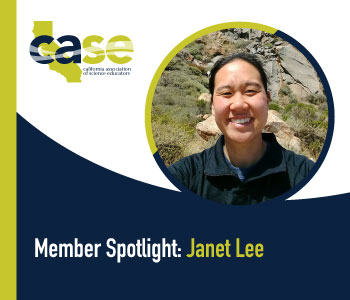
Tell us about yourself.
I’m a high school science teacher in Gilroy, California and prior to that was a science student at UC Berkeley. I appreciate the outdoors and molecular biology and love to see connections between them. I have always loved science. In elementary school, I did the Tech Challenge through the Tech Museum. In high school, I took every AP science I could. In college, I double majored in two biologies. Lab life! Science is a central part of my identity.
Why is being a member of CASE important to you?
CASE is important to me because it brought me a whole community of science educators who all want the same thing - to improve science education. It's important to advocate for science and to push the profession forward. I am glad to be a lifetime member and to contribute on committees and present and attend at the annual CASE conference. I feel like I can make a difference and that the work of CASE is directly related to what I do in the classroom.
In your opinion, what makes CASE special?
CASE is special because it’s member driven. People in CASE are constantly shaping its actions and putting forth changes. It is interwoven with other major organizations to initiate and continue change in many different areas related to science education. I feel connected to the leadership and I am lucky to get to know and work with so many talented and hardworking educators.
What is the best part about having a career in science education?
The best part of a career in science education is knowing that your actions affect the future. We are learning about things that directly affect students and the future. Let’s learn about COVID-19 vaccines because it's related to DNA and mRNA. How about energy and the pole vault? Climate change and carbon cycle? The connections are endless and the relevance is there. Teaching science helps provide a lens to see the world, to be curious, and to solve problems. Being able to help students develop their critical thinking and collaboration skills over time is truly a gift. I am always in awe of how students start on their first day of class and who they become.
What is your all-time favorite movie or book? Why?
My all-time favorite movie is Back to the Future. It’s funny, memorable, and I’ve probably watched it more than anything ever. I love the concept of time travel and this is the original.
If you could instantly become a professional in one skill or talent, what would you choose and why?
Cooking! I’m not very good at it and I think it would be nice to be able to make the things I have visualized in my mind. Plus it’s a lot of applied chemistry! It would be nice to use the skill to share snacks and meals with others.
FEBRUARY 2021 SPOTLIGHT
Meet our next Member Spotlight, Evyn Kessell, a pre-service teacher studying at UC Davis. She’s very passionate about science education and has already had a wide range of experiences inside and outside the classroom. Thanks for interviewing with us, Evyn!
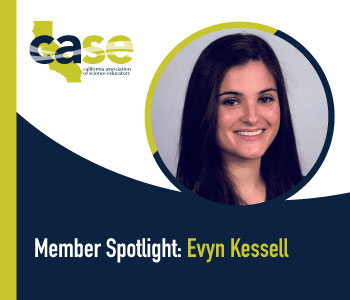
Tell us about yourself.
I am currently working toward my Single Subject Science Teaching Credential and Masters at UC Davis. I am a student teacher in West Sacramento's Washington Unified School District for 6th grade science and high school biology. Before I decided to get my teaching credential, I worked as an Educator at the Sacramento Zoo for 2 years, which was such an amazing experience! It was the job that confirmed that teaching was the right career for me.
I was fortunate enough to grow up in a family full of scientists, so my love of science started from a very young age. I always knew that I would end up in a career within the science field, but I was never exactly sure what path I would take. Besides science, I love getting to work with children, so teaching ended up being a perfect fit! There’s nothing better than experiencing a kid have an “AHA!” moment.
What are your goals once you obtain your degree?
Once I obtain my degree I am hoping to find a position as a middle school science teacher. Middle school is such a fun age and I love seeing the students come into themselves as more independent individuals. They learn and grow so much in such a short period of time. In the future, I am hoping to also get the chance to teach some specialized science courses such as Zoology and Botany, which was my favorite class in high school. My goal as a teacher is to support, encourage, and be an ally for my students. I hope to share my passion for science and help them get excited about science too! Maybe I could even help inspire them to pursue science careers in their futures!
How has being part of CASE helped prepare you for the classroom/education field?
This is my first year as part of CASE, but even in that short amount of time it has proved to be an excellent resource to help me improve as an educator. I have had the opportunity to hear incredibly influential educators and researchers speak and share their experiences and knowledge. CASE also provides access to opportunities such as engaging with other teachers, webinars to learn new skills and fun activities that I can bring into my own classroom. Along with all of that, I also think they have done a fantastic job connecting and providing resources, even in the current distance learning setting.
What would you tell other future educators who are considering joining CASE?
CASE is a wonderful investment in yourself and your teaching career! I strongly believe that as educators we should always be learning new things, and CASE provides excellent resources and opportunities to engage with other passionate science educators and expand our knowledge. I was not able to attend the conference this past year myself, but other members of my cohort attended and they shared some wonderful stories and experiences. Their experience made me really excited to be able to attend conferences in the future! I have heard nothing but good things about CASE and the conferences from every member I’ve ever talked to.
What is your all-time favorite movie or book? Why?
One of my favorite movies is The Labyrinth. There are many reasons I love it- the fun, the fantasy, the slight creepiness, the music, David Bowie, I could go on… but the thing that truly sets it apart from other movies for me is the use of practical effects. The practical effects make it feel even more magical than if they had used special effects.
If you could be an amusement park ride, what would you be and why?
I would choose a rollercoaster, simply because I love them so much! I love the speed, the drops, the loops… maybe that’s why I love teaching so much too?
FEBRUARY 2021 SPOTLIGHT
Meet our first Member Spotlight Fred Nelson. Fred is a professor at Fresno State and a HUGE sci-fi and fantasy fan! You might recognize him from his appearance on the hit TV show Jeopardy! this past fall! Learn more about Fred and his experience on Jeopardy! below!
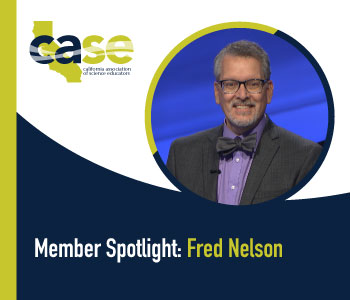
Tell us about yourself.
I’m an Associate Professor of Science Education in the Department of Liberal Studies at Fresno State. I worked as a high school science teacher in Kansas for nine years before moving into science teacher education at the university level. I completed my Ph.D. at the University of Florida in 2012, and started at Fresno State that fall.
I grew up on a farm in Kansas, and worked in a lot of different jobs before finding my purpose as a teacher. Since moving to California, my wife and I have started camping. We spend most weekends in the summer up on the Sierras, away from the heat of the Central Valley.
I also enjoy cooking; I learned to cook watching Julia Child and The Galloping Gourmet on TV. I like to read science fiction and fantasy, and am patiently waiting for the third novel in Patrick Rothfuss’ Kingkiller Chronicle, as well as all things Star Wars.
What is the best part about being an educator?
The work I’m doing now allows me to develop streamlined and efficient opportunities for individuals who know they want to become teachers. I’m most proud of our South Valley Integrated Teacher Education Program where students transfer from community college and complete their BA and teaching credential in 2 years.
Tell us about your experience on Jeopardy! What were some of the highlights and the things that surprised you most?
A whole week of shows are recorded in one day, so contestants are there all day long. You get to the Sony Studio at 7:00am, and the day begins with orientations, makeup, COVID protocols, paperwork, and a rehearsal on the Jeopardy! stage. Using the clicker to buzz in at the exact time is the hardest aspect of the game, so that takes some practice, calmness, and fast reaction time.
Of course, meeting Alex Trebek was a true delight. He was a consummate professional, simultaneously intelligent, curious, and kind. His goal was for contestants to enjoy a well-played game. I was thrilled to be complimented by him on my play in the game.
Why is being a member of CASE important to you?
Being a CASE member helps science educators remain informed about what is happening in the field. Also, it’s a great way to make friends when you enter the profession, being a member of a community, and finding out other folks have some of the same questions you do!
What is your all-time favorite movie or book? Why?
I’ve read Lord of the Rings 45 times, and will read it again this year. Every time I find something new to enjoy, and am totally immersed in Middle-Earth. My favorite movies are any and all of the Star Wars films. I’m entertained by all of them and love the expansion of that universe.
If you could spend a day with one fictional character, who would it be and why?
Doctor Who--I’d like to explore the TARDIS and take a trip to Gallifrey.
